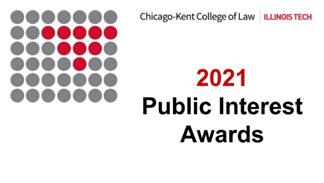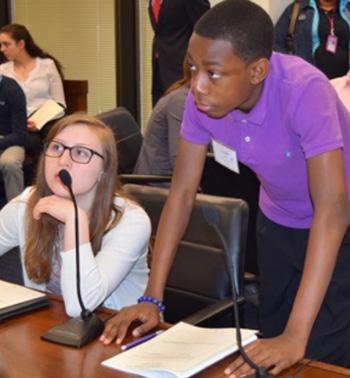
6 minute read
Faculty / Law School News
Chicago-Kent Professor Emeritus Martin H. Malin was appointed as chair of the Federal Labor Relations Authority’s Federal Service Impasses Panel by President Joseph R. Biden. The panel’s members resolve impasses in collective bargaining between federal agencies and unions that represent the agencies’ employees. Malin, who recently retired as director of Chicago-Kent’s Institute for Law and the Workplace, was previously appointed to the Federal Service Impasses Panel under former President Barack Obama in 2009. He was reappointed in 2014 and served until 2017.
—Jamie Loo

Reinforcing the ideal of “equal justice for all,” the Chicago-Kent College of Law’s 2021 Public Interest Awards ceremony celebrated the achievements of dozens of Chicago-Kent students, recognized a long-standing relationship with a Chicago nonprofit, and honored two alumni who have dedicated their careers to helping those in need. The April 26 event’s premier honor, the Ronald W. Staudt Public Interest Partner Award, went to Legal Aid Chicago for the nonprofit’s outstanding contributions to public interest law and its willingness to give Chicago-Kent students experience in the field. Ali Ammoura ’12 and Stephanie Ridella Vittands ’14 received Honorable Abraham Lincoln Marovitz Public Interest Law Awards; and Alexandra Rogers ’21 and Tyler Sprague ’21, co-founders of Chicago-Kent’s Racial Equity and Advocacy Alliance, were honored for outstanding pro bono and community service leadership. Chicago-Kent Research and Instructional Services Librarian Mandy Lee received the national American Association of Law Libraries’ 2021 Minority Leadership Development Award for her “significant work supporting diversity and inclusion in the workplace and profession,” according to an AALL statement. Lee became chair of the AALL’s Asian American Law Librarians Caucus, where she created two new committees, a social committee and a community service committee. The latter committee hosted a “bystander intervention training” for all AALL members, focused on anti-Asian hate incidents. Lee has gone out of her way to introduce Chicago-Kent students and visiting scholars from foreign countries to Chicago, hosting three Thanksgiving dinners in two years.

Jean Wenger, the director of the Chicago-Kent Law Library, was awarded the 2021 Agnes and Harvey Reid Award for Outstanding Contribution to Law Librarianship by the Chicago Association of Law Libraries in May. The organization consists of approximately 200 law librarians who work within Chicago-area law schools, law firms, corporations, courts, and other government entities; the Reid Award is its highest annual honor, given to a single librarian who shows remarkable dedication to the profession.
Clinical Professor
Jonathan Decator-
smith has been appointed as the Chicago-Kent’s clinical education director, putting him in charge of the C-K Law Group and its 11 individual practices. Decatorsmith, who has been interim director since Clinical Professor Richard Gonzalez stepped down in September 2020, has run the tax practice of the C-K Law Group since he was hired by founder Gary Laser in 2000. Thomas Crocker, the N. Heyward Clarkson Jr. Professor at the University of South Carolina School of Law, won the 2020 Chicago-Kent College of Law Roy C. Palmer Civil Liberties Prize for his book, Overcoming Necessity: Emergency, Constraint, and the Meanings of American Constitutionalism, published by Yale University Press in July 2020. The book explored the conflict between liberty and “necessity” in times of national emergency, specifically when a United States president’s rhetoric works to erode constitutional protections.
Chicago-Kent Professor Adrian Walters was awarded Illinois Institute of Technology’s 2021 Michael J. Graff Teaching and Advising Innovation Award in April. The award, meant to encourage teaching practices “designed to improve student learning and success,” is handed out annually to a professor who displays notable innovation.
During the height of the COVID-19 pandemic, Walters researched and familiarized himself with various instructional technologies and online teaching techniques, and shared his experiences with fellow faculty, as well as the college’s Tech Team members.
Chicago-Kent Associate Professor and Associate Dean Alexander Boni-Saenz’s paper “Legal Age” will be published in the Boston College Law Review in spring 2022. The paper explores several ways the law could measure one’s age, and the virtues and vices of each. It centers on the existing “chronological” (year-counting) standard as a touchstone to measure other models— including the “biological model” relating to health, and “subjective model,” relating to how one feels—in order to apply greater scrutiny to current legislation.
Chicago-Kent Assistant Professor Noah SmithDrelich’s paper “The Constitutional Right to Travel Under Quarantine” was accepted for publication in the fall 2021 edition of the Southern California Law Review. The paper explores how an underutilized tenet of the Constitution—the right to travel—could provide a more fruitful basis for scrutinizing quarantine regulations. Smith-Drelich does not argue that such quarantines aren’t important, or that they are unconstitutional, simply that they should be subject to a more stringent form of judicial review. The paper lists historical instances when quarantines led to overreach, particularly against minorities and the disenfranchised.
Daniel Katz, director of The Law Lab at Chicago-Kent, is part of a large international research project that studies the quantifiable growth—in actual words, and how those words connect to and reference each other—of law. The latest paper, “Measuring Law Over Time: A Network Analytical Framework with an Application to Statutes and Regulations in the United States and Germany,” was published in Frontiers in Physics in May 2021. One sample finding: from 1994 to 2018, the total word count of federal statutes in the U.S. grew from 14 million words to 21.2 million words, a 51 percent increase. The effect of that growth, Katz says, will be that for the average person to comply with this ever-growing mass of laws and regulations—in terms of accessibility, starting and running a business, and even adhering to criminal statutes—they’ll need a lot more lawyers to help them understand it. “There should be some thought to ways to construct laws and regulations over time, including sunset clauses. We just can’t keep doing things the same way,” Katz says.
Chicago-Kent Professor Christopher Schmidt’s recently published book, Civil Rights in America: A History, explores the shifting meaning of the term “civil rights.” The book, published in December by Cambridge University Press, is different from the numerous books written on the history of civil rights. Rather than assuming a fixed definition, it delves into how the term itself has changed, and why. From the National Association for the Advancement of Colored People to Black Lives Matter to the National Rifle Association—and even former President Richard M. Nixon—many organizations and individuals have claimed to champion civil rights. Schmidt explores the term’s various meanings, evolutions, and iterations that have served as the basis of these claims.
In his new book about the “pervasive investigative gaze” of increasingly ubiquitous surveillance in the modern world, Chicago-Kent Professor Richard Warner explores how it happened, what its effect is on the average person, and what can be done about it. The Privacy Fix: How to Preserve Privacy in the Onslaught of Surveillance, published by Cambridge University Press in October 2020, suggests that heavy-handed surveillance denies a person’s ability to explore different avenues of personal development, via the ever-present specter of being watched by unknown parties with unknown motivations. He and his co-author, Robert H. Sloan, head of the University of Illinois Chicago Department of Computer Science, believe the privacy protections of the mid-twentieth century have broken down, and point to regulation as a remedy. “We turn to regulation because we assume market solutions are unlikely,” the authors state. “Consumers lack sufficient power and information.” In its effort to teach teenagers constructive discussion about contentious topics, the Chicago-Kent College of Law’s Constitutional Democracy Project hosted a youth summit on “defunding the police,” putting social justice advocates on a panel alongside the president of the Illinois Association of Chiefs of Police.

The Constitutional Democracy Project’s 2021 Illinois Youth Summit brought approximately 120 students from 10 Chicagoarea schools together over Zoom to watch panelists discuss the varied meanings of “defunding the police” and to ask questions on trending law enforcement topics, such as qualified immunity, no-knock warrants, and body cameras.





